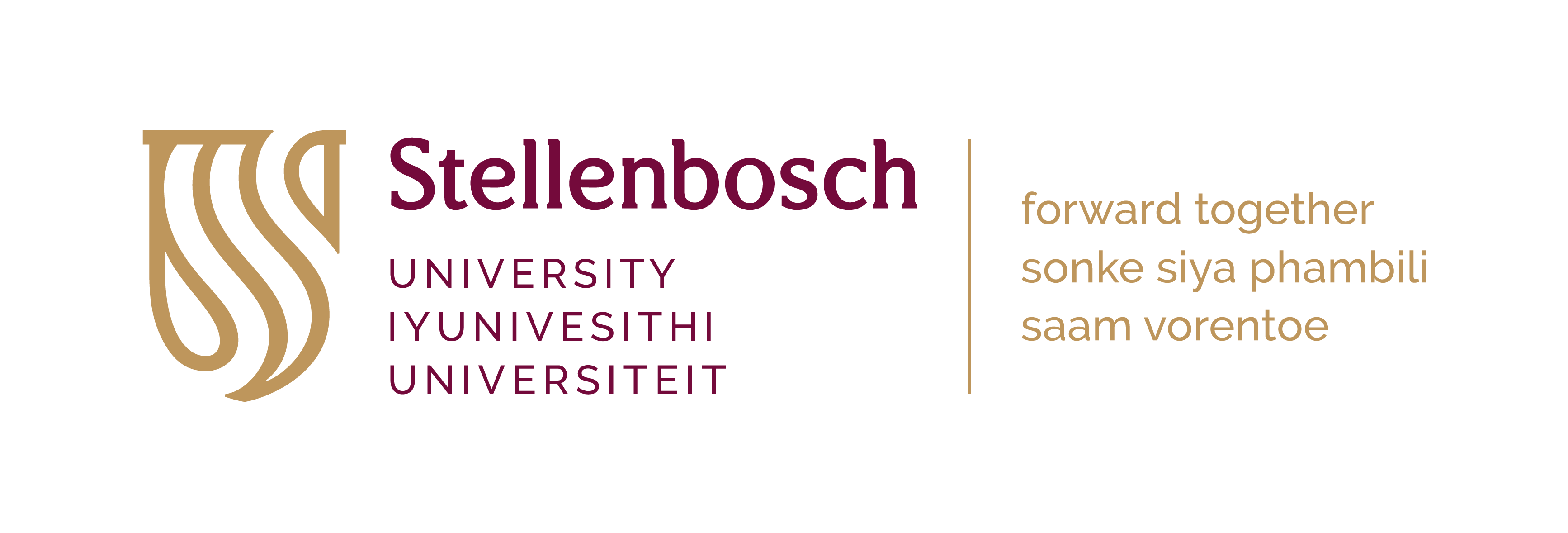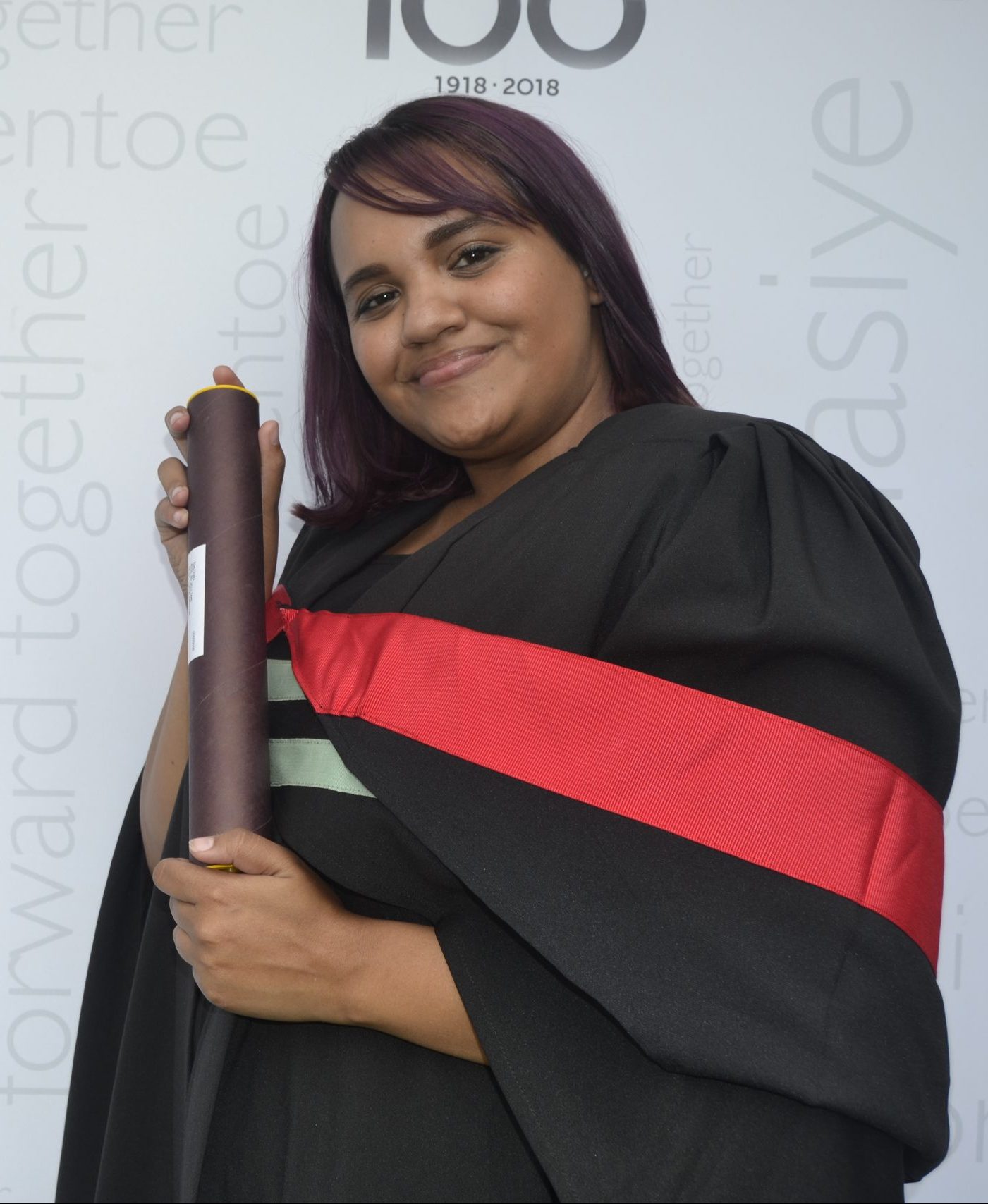[:en]Meet Miss Ricquelle Daphne Williams, a Masters candidate within the TB Drug Discovery Research Group at Stellenbosch University’s Division of Molecular Biology and Human Genetics, Faculty of Medicine and Health Sciences.
In celebration of Youth Month 2020, the Division of Molecular Biology and Human Genetics is paying tribute to young researchers within our institute. We share heart-warming stories of our students whose lives give us great hope for the future of South Africa. We thank these students for volunteering to tell us a little about themselves and their research.
Tell us briefly about your background?
I stay in Cape Town with my amazing mother, father and 9-year old sister. I grew up in an area and in a family where not many were privileged to attend university, but from the day I was born, my parents were adamant that I would indeed reach my dreams and goals!
Why did you choose your field of study – what or who inspired you? Is this what you envisioned for yourself growing up?
Since primary school, I have always been an over-achiever, ensuring that I would always try my utmost best with any work set in front of me. I discovered my passion in high school (Grade 11) when we learnt about the molecular biology of the body. This lesson opened my eyes to the importance of every process which occurs within our bodies and I was just amazed at how amazing the human body is. When you are younger and people ask what you hope to become one day, a very common answer is a “doctor”, with the common reason of helping and healing people. This was also one of my options at first until I job shadowed with my aunt at the Cape Town HVTN Immunology Laboratory where her focus is on the Human Immune Virus (HIV). This opened my eyes to the importance of science and that science is sometimes taken for granted. Not many people know that before you can even treat people with medicine, a lot of research into the components of the medicine is required first, and then it has to be tested in numerous models for which clinical trials are then performed – with this process taking more or less five years.
With this passion in my mind, I decided to study Molecular Biology and Biotechnology at Stellenbosch University. This was the best decision of my life as this degree has always kept me thinking and learning new things in life. I especially loved how nothing is set, and that every day there are always new discoveries in Science.
What is your research focus on?
My research is focused on Mycobacteriology, as TB is a global health concern which is caused by the bacteria Mycobacterium tuberculosis (MTB). Currently, my research involves the identification of secondary metabolites isolated from endophytic fungi in Cannabis sativa to determine whether there are potential antimycobacterial compounds. As TB is widespread within high rural populations, it is important to find the adequate treatment of this disease, especially for immunocompromised people. With the emergence of drug-resistant strains of MTB, it is vital to find novel treatment in targeting this bacterium, therefore, my research aims to find potential antimycobacterial compounds for the treatment of TB.
How can your research help to improve Africa and/or the lives of its people?
Research is an area where I find myself growing as I believe that you are not limited here. I can choose to do my Master’s focused on tuberculosis (TB) whereas I can decide to focus on cancer for my PhD and so forth. Research is extremely important as I believe it forms the foundation for helping people as there are many diseases that still require adequate study and treatment. And, currently, we all know for sure the importance of research with the identification of the new novel coronavirus. Science forms an important part of the world and I am happy to be a part of it.
What obstacles did you have to overcome to get where you are today?
A major challenge that I had to overcome was a fear of the unknown. As a kid, being in my comfort zone was a place where I would always feel safe and secure, so when I got accepted at Stellenbosch University with placement into a residence, I was afraid that this would affect my workflow as I would need to learn to be responsible and independent. Many temptations were thrown my way which could have interfered with my studies, but over time, I learnt to face them by knowing that I am at university to study for my future. I knew that my goal would be to pursue postgraduate studies and the pressure of that pushed me to work harder.
Another challenge I had to face was negativity within myself and comparing myself to other students. There were numerous days where I was faced with the stress of whether I will be able to pass the exam or complete my lab work, and this just made me question and doubt myself. There were also times when I would work hard and pass the exam, but when I compared myself to others, it still felt as though I didn’t work as hard they did. I then knew I had to overcome this. I did it by trying to remain positive in whatever task I had to do and taking a break to breathe, and by building my self-confidence with the knowledge that everyone works differently and that the competition is within me – and not with anyone else.
If you could invite any three researchers (alive or dead; local or international) to a dinner party, who would you pick and why?
I would choose Dr Vuyo Mavumengwana and Dr Elizabeth Blackburn. Dr Vuyo Mavumengwana is a senior scientist in Molecular Biology. His research looks into the identification of antimycobacterial sources obtained from various natural sources. He has the mind of a scientist as he always finds new ways to discover the novelty in various fields. Dr Elizabeth Blackburn is an internationally known female researcher in Molecular Biology. Her research in the molecular nature of telomeres is quite interesting. She also won a Nobel Prize for it, so it would be an honour to get her advice as a woman in science
What is your favourite quote/saying?
“Success is no accident. It is hard work, perseverance, learning, studying, sacrifice and most of all, love of what you are doing or learning to do.” – Pele
Any advice for young people who are considering a career in STEM?
Although you should work hard and try your best to broaden your understanding by reading as much as possible, it is okay to fail. A career in STEM does not mean that every experiment you do is going to be a success. It is also important to know that if your hypothesis is proven to be incorrect, this is also a discovery on its own. Enjoy what you are doing and be proud knowing that you find yourself in a career which could possibly provide novel contributions.
What do you hope to achieve in the future?
My goal is to first obtain my PhD in Molecular Biology, followed by becoming a senior scientist. I hope to discover novel treatments in various fields including mycobacteriology, cancer and hopefully virology, which may contribute to literature.[:]

